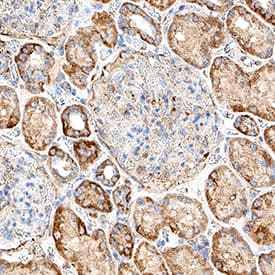Rat IL-4 Antibody Summary
Cys25-Ser147
Accession # P20096
Customers also Viewed
Applications
Please Note: Optimal dilutions should be determined by each laboratory for each application. General Protocols are available in the Technical Information section on our website.
Scientific Data
 View Larger
View Larger
Cell Proliferation Induced by IL‑4 and Neutralization by Rat IL‑4 Antibody. Recombinant Rat IL-4 (Catalog # 504-RL) stimulates proliferation in the rat splenocytes in a dose-dependent manner (orange line). Proliferation elicited by Recombinant Rat IL-4 (4 ng/mL) is neutralized (green line) by increasing concentrations of Goat Anti-Rat IL-4 Antigen Affinity-purified Polyclonal Antibody (Catalog # AF-504-NA). The ND50 is typically 0.05-015 µg/mL in the presence of PHA (10 µg/mL).
Preparation and Storage
- 12 months from date of receipt, -20 to -70 °C as supplied.
- 1 month, 2 to 8 °C under sterile conditions after reconstitution.
- 6 months, -20 to -70 °C under sterile conditions after reconstitution.
Background: IL-4
Interleukin-4 (IL-4), also known as B cell-stimulatory factor-1, is a monomeric, approximately 13-18 kDa Th2 cytokine that shows pleiotropic effects during immune responses (1‑3). It is a glycosylated polypeptide that contains three intrachain disulfide bridges and adopts a bundled four alpha -helix structure (4). Rat IL-4 is synthesized with a 24 amino acid (aa) signal sequence. Mature rat IL-4 shares 41%, 43%, and 59% aa sequence identity with bovine, human, and mouse IL-4, respectively. Human, mouse, and rat IL-4 are species-specific in their activities (5-7). IL-4 exerts its effects through two receptor complexes (8, 9). The type I receptor, which is expressed on hematopoietic cells, is a heterodimer of the ligand binding IL-4 R alpha and the common gamma chain (a shared subunit of the receptors for IL-2, -7, -9, -15, and ‑21). The type II receptor on nonhematopoietic cells consists of IL-4 R alpha and IL-13 R alpha 1. The type II receptor also transduces IL-13 mediated signals. IL-4 is primarily expressed by Th2-biased CD4+ T cells, mast cells, basophils, and eosinophils (1, 2). It promotes cell proliferation, survival, and immunoglobulin class switch to IgG1 and IgE in rodent B cells, acquisition of the Th2 phenotype by naïve CD4+ T cells, priming and chemotaxis of mast cells, eosinophils, and basophils, and the proliferation and activation of epithelial cells (10-13). IL-4 plays a dominant role in the development of allergic inflammation and asthma (12, 14).
- Benczik, M. and S.L. Gaffen (2004) Immunol. Invest. 33:109.
- Chomarat, P. and J. Banchereau (1998) Int. Rev. Immunol. 17:1.
- McKnight, A.J. et al. (1991) Eur. J. Immunol. 21:1187.
- Redfield, C. et al. (1991) Biochemistry 30:11029.
- Ramirez, F. et al. (1988) J. Immunol. Meth. 221:141.
- Leitenberg, D. and T.L. Feldbush (1988) Cell. Immunol. 111:451.
- Mosman, T.R. et al. (1987) J. Immunol. 138:1813.
- Mueller, T.D. et al. (2002) Biochim. Biophys. Acta 1592:237.
- Nelms, K. et al. (1999) Annu. Rev. Immunol. 17:701.
- Paludan, S.R. (1998) Scand. J. Immunol. 48:459.
- Corthay, A. (2006) Scand. J. Immunol. 64:93.
- Ryan, J.J. et al. (2007) Crit. Rev. Immunol. 27:15.
- Grone, A. (2002) Vet. Immunol. Immunopathol. 88:1.
- Rosenberg, H.F. et al. (2007) J. Allergy Clin. Immunol. 119:1303.
Product Datasheets
Citations for Rat IL-4 Antibody
R&D Systems personnel manually curate a database that contains references using R&D Systems products. The data collected includes not only links to publications in PubMed, but also provides information about sample types, species, and experimental conditions.
4
Citations: Showing 1 - 4
Filter your results:
Filter by:
-
Hepatocyte growth factor-modified hair follicle stem cells ameliorate cerebral ischemia/reperfusion injury in rats
Authors: Hao Tang, Xuemei Zhang, Xiaojun Hao, Haitong Dou, Chendan Zou, Yinglian Zhou et al.
Stem Cell Research & Therapy
-
Interleukin-4 Aggravates LPS-Induced Striatal Neurodegeneration In Vivo via Oxidative Stress and Polarization of Microglia/Macrophages
Authors: J Jang, A Hong, Y Chung, B Jin
International Journal of Molecular Sciences, 2022-01-05;23(1):.
Species: Rat
Sample Types: In Vivo, Whole Tissue
Applications: IHC, Neutralization -
Interleukin-4 and Interleukin-13 Exacerbate Neurotoxicity of Prothrombin Kringle-2 in Cortex In Vivo via Oxidative Stress
Authors: JY Jeong, YC Chung, BK Jin
Int J Mol Sci, 2019-04-19;20(8):.
Species: Rat
Sample Types: Whole Tissue
Applications: IHC -
Endogenous expression of interleukin-4 regulates macrophage activation and confines cavity formation after traumatic spinal cord injury.
Authors: Lee SI, Jeong SR, Kang YM
J. Neurosci. Res., 2010-08-15;88(11):2409-19.
Species: Rat
Sample Types: In Vivo, Whole Tissue
Applications: IHC-Fr, Neutralization
FAQs
No product specific FAQs exist for this product, however you may
View all Antibody FAQsIsotype Controls
Reconstitution Buffers
Secondary Antibodies
Reviews for Rat IL-4 Antibody
There are currently no reviews for this product. Be the first to review Rat IL-4 Antibody and earn rewards!
Have you used Rat IL-4 Antibody?
Submit a review and receive an Amazon gift card.
$25/€18/£15/$25CAN/¥75 Yuan/¥2500 Yen for a review with an image
$10/€7/£6/$10 CAD/¥70 Yuan/¥1110 Yen for a review without an image

























